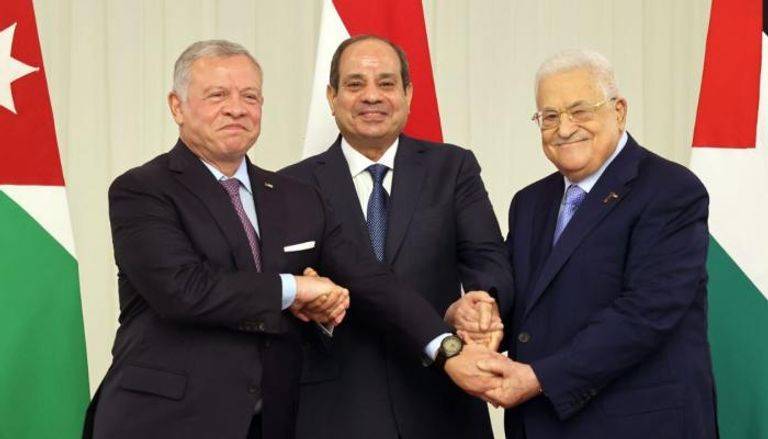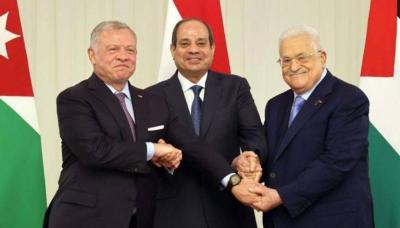The Egyptian, Jordanian, and Palestinian summit in Alamein, Egypt, affirmed on Monday that the only way to achieve peace in the region is to implement United Nations resolutions. The statement released after the summit, which included Egyptian President Abdel Fattah el-Sisi, Jordanian King Abdullah II, and Palestinian President Mahmoud Abbas, stated: "The summit discussed the developments of the Palestinian issue in light of current developments in the occupied State of Palestine and the related regional and international situations."
The leaders emphasized the priority that the three countries give to the legal, international, and Arab references for resolving the Palestinian issue, foremost among which is the need to end the Israeli occupation of the territory of the State of Palestine within a clear timeline and restore the Palestinian people’s full legitimate rights, including their right to self-determination and to establish their independent and sovereign state along the lines of June 4, 1967, with East Jerusalem as its capital. They also called for resolving the issue of Palestinian refugees in accordance with international legitimacy resolutions and achieving a two-state solution based on the agreed references.
The statement continued: "The leaders affirmed that resolving the Palestinian issue and achieving a just and comprehensive peace is a strategic choice and a regional and international necessity, as well as a matter of global security and peace." They reiterated that the only path to achieve this peace is through the implementation of related United Nations and Security Council resolutions, enabling the Palestinian people to enjoy their inalienable rights, and ending the Israeli occupation, thus establishing an independent sovereign State of Palestine with East Jerusalem as its capital, in line with a two-state solution based on international law and agreed principles, as well as the Arab Peace Initiative.
The leaders stressed the necessity for Israel to fulfill its obligations and commitments under international law, international humanitarian law, and previous agreements and understandings, including those made with the Palestinian side. They also called for adhering to previous commitments, including those outlined in the outcomes of the Aqaba and Sharm El Sheikh meetings, and urged Israel to bear its responsibilities, cease its aggressions, and calm the situation on the ground in preparation for reviving peace negotiations.
The summit demanded that Israel respect its obligations as the occupying power in Palestinian territories, including East Jerusalem, and stop incursions into the occupied West Bank cities, which undermine the Palestinian government's ability to perform its duties. They called for lifting the blockade on the Gaza Strip and refraining from practices that escalate tension and violence and threaten to ignite the situation. The leaders also emphasized the importance of Israel releasing withheld Palestinian funds without legal justification, as this violates agreements made in this regard.
They condemned the violation of the legal and historical status quo in the city of Jerusalem and its sanctities, and called for the cessation of incursions into the Al-Aqsa Mosque/Al-Haram Al-Qudsi Al-Sharif.
The leaders reiterated their commitment to the Arab Peace Initiative in all its elements, which is based on international law and international principles and represents the most comprehensive proposal for achieving a just peace that meets the aspirations of all peoples in the region for a stable future characterized by coexistence, development, and cooperation among all its peoples and states.
They highlighted the importance of continued international support for the United Nations Relief and Works Agency for Palestine Refugees in the Near East (UNRWA), and the necessity of standing by the agency and assisting it in its current financial crisis, in order to provide the financial support it needs to continue offering vital services to Palestinian refugees as mandated by the UN, until refugees are enabled to exercise their right of return based on resolution 1940.
The leaders agreed to continue consultations and intensive coordination within the framework of the trilateral coordination format at all levels to draft frameworks to activate international efforts aimed at achieving the legitimate rights of the Palestinian people, including through the resumption of negotiations, and to work with brothers and partners to revive the peace process, ensuring an end to the Israeli occupation and achieving just and comprehensive peace in accordance with international law and the agreed-upon international references.




